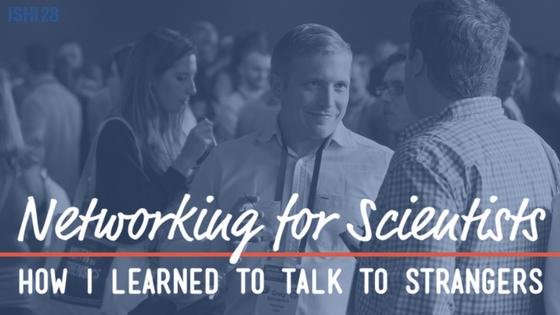When thinking about career opportunities in science (and in any field really), solid networking skills can be the key factor in determining where and how you’ll be spending your next holiday. Networking breaks down into two parts: small talk/meeting people and establishing/maintaining job-relevant connections.
Neither of these things are rocket science, but can be particularly difficult depending on your personality. I realized early on that if I wanted to stay up on the latest, unpublished results, if I wanted to find out what other labs were working on, or if I wanted to know who was looking to fill a position before it was listed, I would need to master this skill. It took lots of practice, but I now consider myself pretty darn good at this networking thing. I even used the same strategies I used in the science world to build a network in the local music scene and it worked! In this post, the first of three parts, I will address small talk.
Written by: Karen Reese, Promega
Coffee breaks and poster sessions at conferences and meetings hold some of the most important opportunities for our careers. However, these can be some of the most excruciating moments for us more introverted types. What if we say the wrong thing? What if we say something stupid? And the worst possible, What if no one talks to us?? I worked very hard to overcome my fear of talking to strangers in the interest of my career, so hopefully following these few tips will help make small talk more bearable for some of you. I still find talking to strangers extremely exhausting, but I can do it! It’s not nearly as hard as it used to be. I hope you will find these tips useful. Feel free to follow the advice, and in the spirit of the topic, contact me if you have any questions!
They are scared of you as you are of them.
What your mother told you about spiders is true about your colleagues. I’ve talked about this issue with a number of scientists and precious few have told me they look forward to making small talk. Don’t worry about saying something stupid. If you do, you will only be helping the person you talk to feel more comfortable. (Either that or you’ll have a really good story to tell your mom when you get home.)
Fake it till you make it.
Before poster sessions at conferences, I used to literally have to go to the bathroom or my hotel room and psych myself up for these moments. I would close my eyes and tell myself, “You know your stuff, you’re good at what you do, shoot, you’re the best! You can do this.” Etc, etc. I’d run out there like a football player running to the field and begin the game. Sure, I took some hits, probably even committed a few fouls, but I definitely scored some great connections. The appearance of confidence will get you a long way.
Positive self-talk is as effective as negative self-talk.
Think about it, what if you spent as much time telling yourself you can do this as you do telling yourself how scared you are about it? You spend most of the day before one of these events telling yourself how you’re not looking forward to it and questioning all possible things that can go wrong. Practice questioning all possible things that can go right instead! This does take focused work.
Do your homework.
Before you get to a conference, meeting or social function, check out the program guide and abstracts to see who will be there. Circle the names of people you would like to talk to and do a little research. Find their lab website to learn about the lab’s general aims. Look up a couple of papers and at least read the abstracts. When you approach a person of interest, you can initiate conversation with something they want to talk about.
Take risks.
Get over yourself! Everyone makes mistakes. You are not so different from others as you think you are. Go ahead and talk to that professor you compare to Barbara McClintock and George Washington Carver. If you can’t bring yourself to do it, approach his/her student or post-doc first. At the next meeting coffee break or mixer, challenge yourself to meet at least one new person. Walk up to a stranger and introduce yourself.
Take a deep breath and go for it! Get a little practice in and watch for my next post about establishing/maintaining job-relevant connections.
WOULD YOU LIKE TO SEE MORE ARTICLES LIKE THIS? SUBSCRIBE TO THE ISHI BLOG BELOW!


